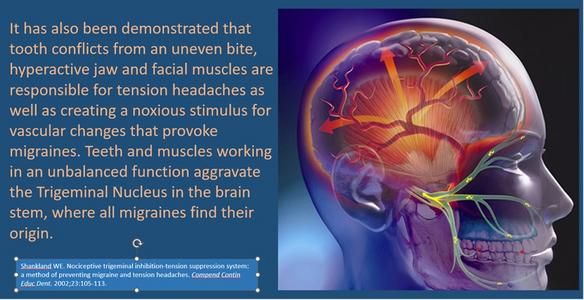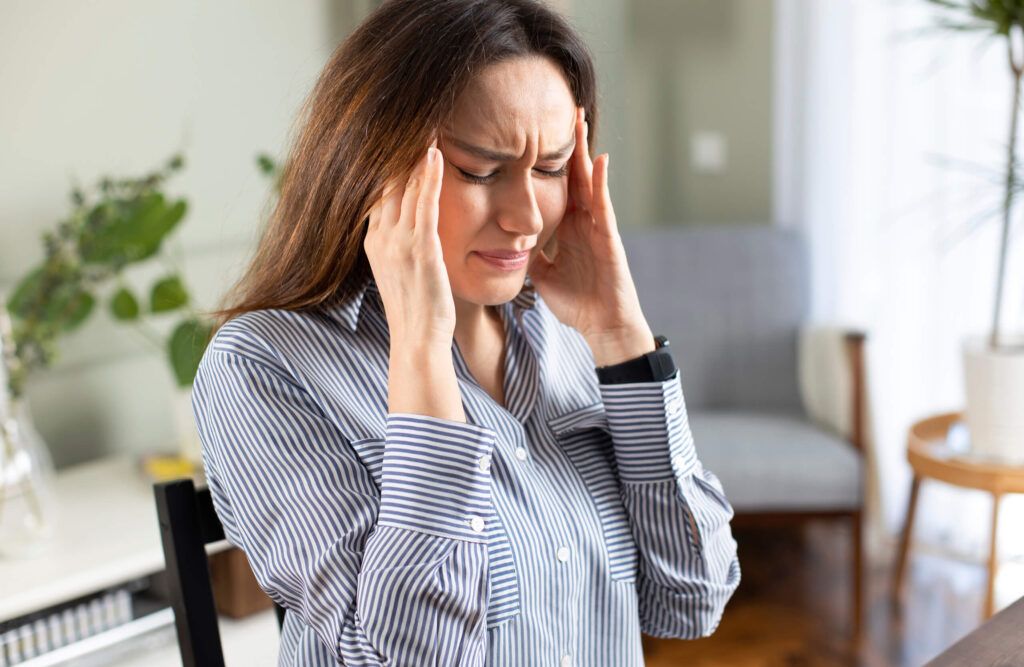
Can TMJ cause migraines or headaches?
In North America, over 40 million people suffer from chronic headaches and migraines. Most of them aren’t aware that an uneven bite (also called malocclusion) can cause TMJ Migraines & Headaches.
In other words: when your teeth are misaligned, when they don’t fit together properly, the strain on both muscles, and the brain, can create tension headaches, migraines, cluster headaches, sinus headaches, forehead headaches and other pain that may get classified as a headache.
There are many causes of headaches and just as many ways to manage them. Medical doctors often use medication to manage the pain someone has. Some will include BOTOX treatments and muscle injections.
The trouble with these treatments is that they are meant to “manage” the pain and not prevent the pain by addressing the source and drivers of the pain. The same goes with physiotherapy, chiropractors, massage therapists and other healthcare providers. Medical Doctors primarily focus damping the effects of certain headaches, and masking pain with just medications.
Dr. Bramanti can actually help prevent the headaches from starting. Dental treatment that focuses on biomechanical strain to the body that has the effect of either creating muscle strain for tension type headaches, or may help provide changes in blood flow within the lining of the brain, helping migraine sufferers.
Headaches and migraines can have a medical solution, but there can be a dental solution too. Palliative care that masks pain or temporarily moderates pain is an impotent option. But dental TMJ orthopedic treatments and therapy provided by Dr. Bramanti can target the source and drivers of the headaches and eliminate the pain altogether.

What do migraines feel like?
Probably one of the most common headaches people experience is a migraine. The term migraine is tossed around easily in the general population to indicate a “mean” headache.
Migraines though do not always show up the same way. Some are on one side of the head. Some express pain around the head like a band of pain.
Some migraines will start with an aura or change in vision. Some will create a taste in the mouth. Some will start slow. Some will start with a snap. Some migraines come from changes in atmospheric pressure. Some will be triggered by food. Some start with the allergy season.
Whatever the presentation, the cause has been shown as a buildup of blood pressure on the brain. Either through dilation of the blood vessels in the “meninges” (brain coverings) or a lack of good blood drainage through the neck. Most recent medications for migraines have concentrated on the hormone central to migraine, called CGRP or Calcium Gene-Related Protein.
Orthopedic dental treatments provided by Dr. Bramanti can help reduce the neural aggravation of the migraine center in the brain and thereby control the release of CGRP, and thus help prevent migraines in the first place.
Do TMJ headaches go away?
Headaches are signals that something is wrong. It could be medical. It could be serious. It should be checked out and examined. Do not take headaches as a mere inconvenience. Tylenol is not a natural food source. It is important to know what is causing a headache in order to treat it:
Some headaches are a symptom of a sleep disturbance issue. They show up in the morning as a dull ache.
Some headaches are muscle related. Or more accurately muscles and their lining called fascia. These often form “trigger points” of pain caused by adhesions within the fascia.
Some headaches are neural in origin. Headaches can be started with a neural overload to the brain stem of a nerve called the “Trigeminal Nerve”. Overloading and aggravation of this nerve causes a release of a hormone called CGRP which is delivered to vessels in the lining of the brain. This hormone causes blood vessel dilation and this has been proven to begin the brainstorm leading to migraine attacks.
Some headaches are due to head/neck misalignment that can alter blood drainage out of the brain.
What if my Medical Doctor does not solve my headaches?
If you have trouble finding the cause or causes of your migraine or headache, get a second opinion from a variety of healthcare providers, especially a Board-Certified TMJ Dental Specialist like Dr. Bramanti. Remember that it is most likely not just your head that is involved in your headaches. Your body is all connected and signs and symptoms causing headache may affect the whole body.
How TMJ causes migraines?
It has been shown that over stimulation of a part of the lower brain, called the Trigeminal Nucleus, will cause the vasodilator CGRP to be released in the brain. So what causes this over stimulation of the brain? It turns out that those areas that the Trigeminal Nerve services, like teeth, jaw muscles and sinuses, can be the culprit.
Tooth decay or root canal, a recent dental filling, an uneven bite, uncontrolled clenching and grinding of teeth, a barometric pressure increase that stimulates the sinus lining, all can contribute to the Trigeminal Nerve overload and in effect stimulate a migraine.
Treating the root causes of migraines to help prevent their occurring is better than merely masking the migraine with medicines when it comes.
How to get rid of TMJ Migraines or Headaches?
I want to stop having to always take medication for my headaches.”
… is what Dr. Bramanti hears very often from TMJ patients.
How to get rid of TMJ Migraines and Headaches? The answer is simple: Seek TMJ treatment with a TMJ Dental Specialist like Dr. Bramanti because your TMJ Migraines & Headaches will not miraculously disappear.
Dental malocclusion, an uneven bite, muscle imbalance, strain from tooth clenching and grinding all affect the workings or physiology of your body. Bringing balance back to the body can help you fight the painful occurrence of both tension headaches and TMJ Migraines.
Getting rid of a TMJ disorder requires realigning your jaw joint into its true position and rebalancing your bite. Meaning: You may need orthopedic appliance therapy to realign the jaw, and possibly dental treatment to make your teeth properly mesh together again in a balanced bite. A TMJ Migraines & Headaches Diagnosis is necessary to define the severity of your TMJ disorder. A detailed TMJ Disorder treatment plan is required to define the best path forward according to your personal condition.
Dr. Bramanti is an expert in TMJ Disorder diagnosis and treatment and he will guide you to the best path for health and relief.
